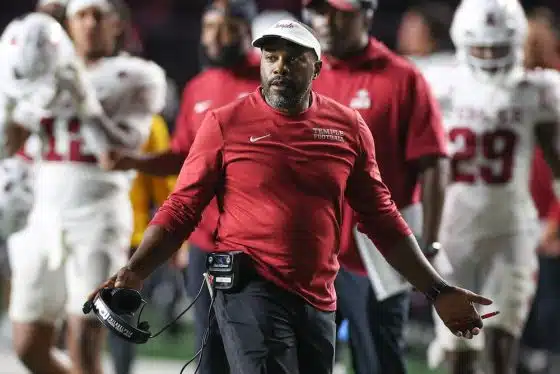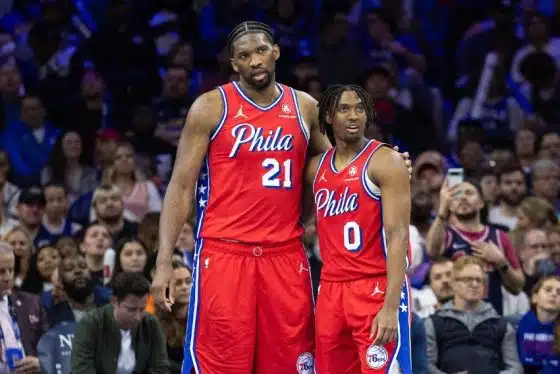Uncategorized
Both Sides of Eagles’ Riley Cooper Conundrum
When ProFootballTalk.com reported that interest in Riley Cooper’s services were going to be high, the thought process was to say goodbye to Cooper. Why would the Eagles get into a bidding war for a controversial wide receiver that had just one good year? As the thought process progressed, the real question quickly became, why wouldn’t the Eagles want Riley Cooper back? Here, Matt Lombardo and Hal Greenblatt will tackle both sides of this lightning rod issue to the Eagles offseason.
Keeping Cooper:
By Hal Greenblatt
Riley Cooper’s past has been well documented. His saga to get from second string wide receiver to starting wide receiver has been told. His story though, has just begun.
The Florida alumnus set career highs in receptions (47), yards (835), and touchdowns (8). He averaged 17.8 yards per catch, which tied him with Calvin Johnson for third in the league. Cooper’s stats become even more impressive when they are broken down into Nick Foles starts and Michael Vick starts.
With Foles at the helm, Cooper hauled in 39 catches for 742 yards and seven touchdowns. In Foles’ ten starts, Cooper was targeted early and often. He was kept in the game mentally and could be considered Foles’ go-to receiver. With Vick starting, the former Gator produced just eight catches for 93 yards and one touchdown.
The difference in production stemmed from Cooper and Foles spending a full year together on the second unit. Continuity and practice between the two players led to a breakout season for the wide out. That is just one reason to bring him back.
Cooper’s special teams prowess is another crucial reason to re-sign the four-year veteran. Although Chip Kelly took the receiver off of special teams following Jeremy Maclin’s injury, Cooper’s previous history showed that he was vital to the performance of the Birds special teams. Cooper is a willing blocker on offense and was able to utilize his past special teams skillset to help lead the Eagles to the number one rushing attack in the league.
The 6’3” wide receiver also provides great versatility and consistency for the Eagles. On offense, he provides a big target in the red zone, as well as all over the field. Cooper has been a reliable target for Foles to find when in trouble, as he has often come down with jump balls that the quarterback has thrown up for the tall receiver. Cooper was also targeted 83 times on the season, dropping only three passes. The free agent-to-be has shown a reliability this season needed to help the Eagles succeed.
As the wide receiver enters his fifth year in the NFL, the biggest question burgeoning the Eagles is has Riley Cooper reached his highest potential or is there still room to grow? So the Eagles must now decide if spending the money to re-sign Cooper is the right decision to make. But haven’t the above reasons already answered that question?
Time for Eagles to Move On From Cooper
By Matt Lombardo
As the 2014 offseason is about to begin in earnest with free agency not far behind on March 11th, there is no doubt that the names Riley Cooper and Jeremy Maclin have been discussed and likely debated inside the executive suite of the Novacare Complex ad-nauseam.
The right side of that argument is for the Eagles to look in another direction at receiver and put the tumult of last summer's controversy surrounding Cooper's actions at a Kenny Chesney concert squarely in the rearview.
While it's undeniable that Cooper and Foles developed an on-field rapport when the second-year signal caller took the reigns from Michael Vick as the starting quarterback last season, it's also impossible to overlook the fact that much of Cooper's production came in three games.
Cooper exceeded the century mark in receiving yards just three times, against the Green Bay Packers, Oakland Raiders and Tampa Bay Buccaneers. In those three games, the University of Florida product totaled 12 catches for 361 yards and six of the eight touchdowns he caught all year.
The fact that Cooper caught just one touchdown in the team's final six games of the season should sound alarms when considering paying Cooper the kind of big-money, long-term contract that he is rumored to be on the verge of acquiring in free agency.
There simply isn't one aspect of Cooper's game that one can point at and say he is truly great at. He is not a prototypical deep threat, nor a red-zone target. At best, Cooper could be considered a possession receiver, but because of desperation around the league to add at this position, his deal is likely to outweigh his on-field production.
This is a draft class that is chalked full of high caliber talent at the wide receiver position. From Florida State's Kelvin Benjamin, Penn State's Allen Robinson, Clemson's Sammy Watkins and Texas A&M's Mike Evans, the Eagles should be able to come away with a top tier prospect in the draft at a much smaller cap number than Cooper will command moving forward, who may be a more polished receiver overall.
Chip Kelly and the Eagles certainly handled the collective outrage from a majority of the locker room over Cooper's actions correctly in the sense of a marathon that is a complete NFL season, there remained scars from the way his transgressions were handled in the sprint of the immediate aftermath of the incident.
With the options available to the Eagles both in free agency and the draft, the winning side of this debate is simple. It's time to move past Cooper and on to building a more complete receiving corps.












































